Published Aug 23, 2014
From the Mid-West to the Final Frontier
From the Mid-West to the Final Frontier
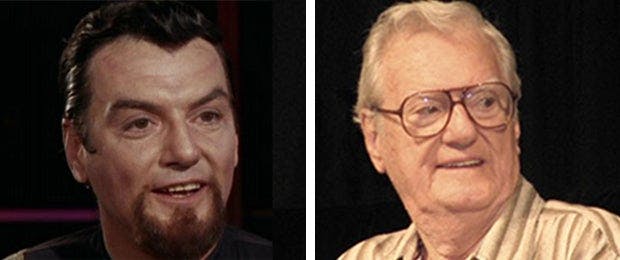
We had not yet met William Campbell when he was the spoiled-child alien, Trelane, in “The Squire of Gothos.” We got to know him later when he played Koloth in “The Trouble with Tribbles.” Though his Klingon character was arrogant, we found the actor to be an affable man off-camera. ‘Charming’ was the description almost everyone agreed upon.
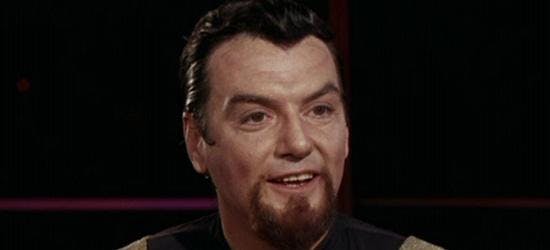
Born on October 30, 1923 in Newark, New Jersey, he grew up to study acting with many others who went on with acting or directing careers: Tony-winner Uta Hagen, stage and film director Daniel Mann and Herbert Berghof, a stage and screen actor who married Uta Hagen. He also served with the US Navy in the Pacific during WWII.
Campbell’s younger brother, screenwriter Robert Campbell (R. Wright Campbell), wrote wrote sci-fi or horror scripts, among other screenplays, mainly for Roger Corman, including Captain Nemo and the Underwater City, Masque of the Red Death,Teenage Cave Man, and Man of a Thousand Faces, a rather loose Lon Chaney bio, with another Star Trek actor, Celia Lovsky (T’Pau), as Chaney’s deaf-mute mother. One of R. Wright Campbell’s scripts, The Invasion, included Bill as a member of the cast.
Campbell was married three times. He was married to his first wife, Judith Inmoor Campbell, from 1952-1958. She claimed to be the mistress of, or have had affairs with, Frank Sinatra, John F. Kennedy, and as Mafia boss, Sam Giancana. She wrote a memoir, My Story, as Judith Exner, on which the TV drama Power and Beauty (2002) was based. Canadian actor Grant Nickalls played William Campbell. His very short marriage to Barbara Bricker was annulled, and he married Tereza Campbell, a marriage that lasted nearly 50 years -- until Campbell’s death. Tereza was a lovely and sophisticated woman, who supported Bill in his causes.
He was ex-brother-in-law to comedian/actor Gary Morton and Susan Morrow, who played Lambda in Cat Women on the Moon. Morrow was the older sister of Judith Campbell, Bill’s first wife.
Sadly, Campbell never achieved the star status he so richly deserved, but he was always the professional in his long and varied career. He used his real name with minor variations, such as Bill or William, during his acting career.
But he had a distinctly human side as well, getting involved with causes when he could. During his acting career, he worked enthusiastically for the Motion Picture & Television Fund, at one point acting as its chief fundraiser. He maintained an abiding interest in this project for the remainder of his life. We became involved when our media convention, Equicon, donated several thousand dollars to the Motion Picture & Television Fund: www.mptf.com/.
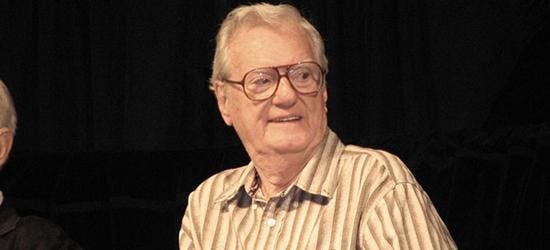
After that, we Trimbles became frequent visitors to the Motion Picture Home. On our first visit, Bill happily showed us around. We saw the large, friendly dining room, where a very large aviary had been built against one window. Residents could bring their pet birds with them to the Home, and visit them every day. Bill commented that, unfortunately, other larger pets could not be accommodated. As we went back to our car, we passed several of the private cottages for those still capable of assisted independent living. Seeing a small poodle curled up on one doormat, John said “I thought pets were not allowed here.” Bill said, “No they aren’t.” John said “Then what is that poodle doing here?” With a perfectly straight face, Bill looked at the little dog, and said “What poodle?”
We were also invited to several high-powered fund-raising events for the Motion Picture Home. One of our fondest memories was when a fancy BBQ was held to impress a group of wealthy and influential people. The women arrived in expensive dresses and a great deal of jewelry. Campbell said later that those outfits could have been better used as checks for the Motion Picture Fund. We agreed. Even Beverly Hills and Bel Air residents are impressed with film celebrities, so Campbell had invited several actors to the BBQ.
One of the actors was Western sidekick, Chill Wills, whose forthright manner took some of the people aback. Of course he was plied with questions, among them if he’d ever worked with any famous females. He drawled, “Naw, I’ve only worked the producer’s or director’s girlfriends; the kinds with an ass like a forty-dollar cow.” John and I nearly fell over with laughter, while most of the others sat like boiled owls. It was a great moment.
Campbell loved to talk about acting, and the parts he played. He began his film career in 1950 with a small part in the John Garfield film, The Breaking Point. His decades-long acting career included many feature films (Dementia 13, Holiday for Sinners and Hush, Hush Sweet Charlotte, among others) and TV series, from Westerns to horror to sci-fi. He was described by film reviewers as having the “languid manner of Robert Mitchum” and the “laid-back anarchism of Jack Nicholson,” but he never went beyond supporting roles. That said, major actors often commented that Campbell frequently stole a scene.
It was often noted that Campbell had a strong resemblance to flamboyant pianist Liberace. In light of Campbell’s own flashy depiction of Trelane, it is strange that no one thought to create at least a TV bio-pic about Liberace starring Bill. We think he would have been superb in the part, but Liberace’s fame was dimming, so it probably didn’t look like a promising project to the bean-counters.
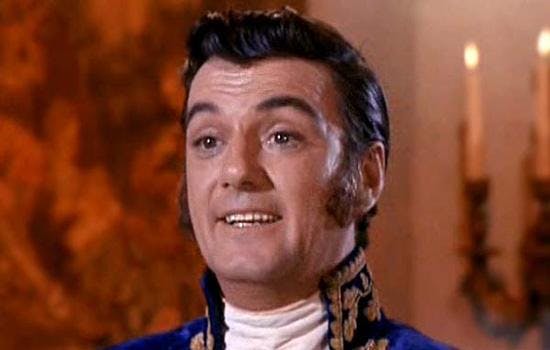
Along with his acting career, Bill was frequently a guest star on major TV shows. His breezy and forthright manner, combined with his dark good looks and his professional manner, made him a favorite of producers, directors and TV viewers. Yet his film roles were often of unlikeable characters, such as the perjurer, Frank Korvac, in The People Against O’Hara, or Hobie Wheeler in The High and the Mighty, with John Wayne. His sole important leading role was as ruthless hoodlum, Caryl Chessman, in Cell 2455, Death Row. Bill’s roles weren’t all bad guys: He sang with Elvis Presley in Love Me Tender, but his voice was later dubbed. He told us that meeting Elvis was … interesting.
After Bill signed with schlock producer Roger Corman, he acted in several forgettable horror films. He had a lot of funny stories abut Corman, relating how he was extremely tight-fisted and utterly without morals. It was fun to sit with Campbell and hear inside tales of the man who contributed so many dreadful horror movies to the world. Bill told about how Corman saved production money by filming the same scene several times, with slightly changed dialogue and new angles. That way, Corman could put several films together for the price of one. Campbell said that in making what he thought was one film, he ended up in five movies! Some actors tried to get paid for appearing in those extra films, but they seldom managed to shake any funds from Corman.
William Campbell came to Star Trek in 1967 as Trelane in a first season episode, “The Squire of Gothos.” He thoroughly enjoyed the experience, and “most of the actors.” His costume was one of the few not designed by William Ware Theiss, but rented from Western Costume. This was mainly due to time constraints. Bill loved that beautiful blue velvet coat, but it had to go back to the rental company.
Years later, at an early Equicon, we were able to present that coat to Campbell as a gift for appearing at our convention. A fan-turned-pro (but still very much a Trek fan) bought one of the coats from Western Costume when it was getting rid of duplicate costumes. Most productions have several copies of any given costume so production is not slowed if something happens to one costume. Thus, there are at least half a dozen Wizard of Oz ruby slippers, and so on.
Bill delighted the Equicon audience by putting on the coat, taking a pose, and exclaiming, “Are you challenging me to a duel?” We also introduced the fan to Campbell, who thanked him profusely. The fan said he was well rewarded for his purchase.
Fans were so taken by this actor that it seemed a good idea to cast him in another Trek episode, so he went into Klingon makeup as Koloth in David Gerrold’s “The Trouble With Tribbles.” His acting versatility showed here: he could be the affable if unstable Squire, and then become a sneering menace in another episode. Both David and Trek fans were pleased with Campbell’s performance, which showed off his versatility. Though Campbell did not personally appear in the DS9 episode “Trials and Tribble-ations,” footage of Koloth was incorporated in the episode
Gene Roddenberry liked Campbell’s performances so much that he was cast as Grady in the 1971 feature film, Pretty Maids All in a Row, written by Roddenberry. When Star Trek’s future seemed dim, Bill moved on to other TV productions, until 1993, when he voiced Trelane for a video game, Star Trek: Judgment Rites. Like so many other film actors, he discovered that voice-overs were low-key jobs that required no dressing up.
When Star Trek: Deep Space Nine came along, Campbell was called upon to reprise his role as Koloth. He appeared in “Blood Oath” with two other original series Klingons, Michael Ansara (Kang) and John Colicos (Kor).
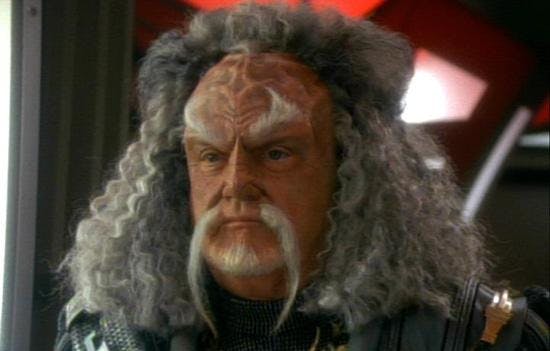
Roy Rogers’ sidekick, Pat Buttram, brought the idea of the Golden Boot Award to the Motion Picture & Television Fund, and Campbell endorsed it. The awards were first presented in 1983 to honor actors and film crew who made significant contributions to the genre of Western television and movies. Money raised at the award banquet is used to help finance various services offered by the Fund to those in the entertainment industry. For the first Golden Boot Award banquet, Campbell talked a bunch of local fans into assisting at this event, which was held in the covered rodeo arena of the Los Angeles Equestrian Center. John showed celebrity guests to their tables (he looks good in Western garb!), and Bjo waited tables, something she had not done since early college days.
While it is a money-saving idea to recruit amateurs for such an endeavor, there are hazards. One was giving a star-struck bunch of people several cups of hot coffee to serve to celebrities they’ve always wanted to meet. Another was having a group of fans falling all over themselves when Bruce Boxleitner made his entrance standing up on a galloping horse. We didn’t have any choice in whose table we served, so Bjo didn’t get a chance to meet Clayton Moore (The real Lone Ranger), or Rex Allen. Bjo’s table included Lash LaRue, Ben Johnson, and Buddy Ebsen, She was thrilled to meet LaRue, who was a girlhood hero, but didn’t have much time to talk to him because she had to keep out of Mr. Ebsen’s reach; he imbibed a bit, and was inclined to pinch fannies.
The Golden Boot fund-raiser was a major success, but it continued without the Trimbles, who became busy with real life. In 1996, William Campbell himself was given a Golden Boot Award for his many Westerns. This was by vote of the Western community.
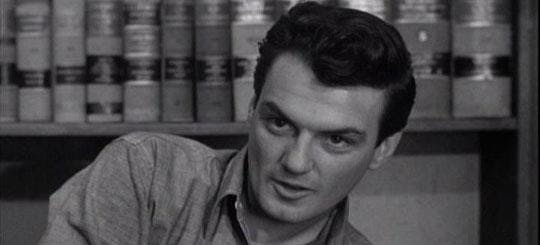
Campbell was well-liked amongst his fellow actors, and a good friend to those he liked. He was best man at James and Wende Doohan’s 1974 wedding and a popular regular at many Trek conventions and cruises. Bill played his last on-screen role in Kung Fu: The Legend Continues in 1996. His last voice role was in the 2004 video short: To Boldly Go… Season One. He died on April 28, 2011, appropriately, at the Motion Picture Home & Hospital in Woodland Hills, California. We’re sure he’d very much enjoy having fans continue to donate to the Motion Picture Home & Hospital fund in his memory: https://www.mptf.com/donate

